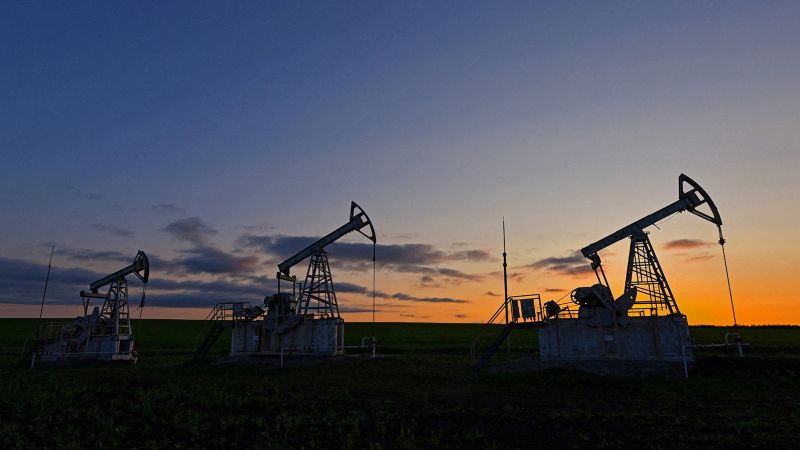Oil prices edged higher, while global stocks and the ruble fell early Monday as investors reacted to the weekend’s brief and chaotic insurrection in Russia.
Markets were largely focused on whether the turmoil in Moscow could disrupt global energy supplies. Russia is the world’s second biggest exporter of oil.
US crude oil futures briefly climbed 1.3% during Asian trading hours. They later pared those gains, and were last up 0.5%. Brent crude, the international benchmark, added 0.6%, also trimming earlier gains. Both lost nearly 4% last week.
“Given that the short-lived event this weekend in Russia appears to have ended, we do not expect to see such a significant increase in oil prices,” analysts at Rystad Energy wrote in a note.
“We do, however, believe that the geopolitical risk amid internal instability in Russia has increased. As such, we are likely to see a marginal uptick in oil prices in the coming days, if the situation does not deteriorate further.”
Russia glimpsed the threat of armed insurrection over the weekend, with Wagner Group mercenaries marching toward Moscow as President Vladimir Putin vowed retribution, before a sudden deal seemed to defuse the crisis as quickly as it had emerged.
Although the immediate risk of bloodshed appears to have dissipated, much remains uncertain. US Secretary of State Antony Blinken said Sunday that the insurrection shows “cracks” in Putin’s role as a leader of the country.
“The potential risks to watch may be on any renewed opposition from the Russian public to Putin’s leadership,” said Yeap Jun Rong, market analyst at IG Group.
Signs that global energy demand could weaken as economies slow have pushed US crude prices down by nearly 14% so far this year to just under $70 a barrel. The international benchmark, Brent crude, is down by a similar margin.
But anything that could jeopardize Russia’s ability to keep supplying global energy markets will be watched anxiously by policymakers in the West and by the country’s biggest customers in Asia.
Reacting to the short-lived Wagner insurrection, the Russian ruble opened at its lowest level in nearly 15 months. It last trading down 1.9% at 85.2 per US dollar.
Asian stock markets were choppy on Monday.
Japan’s Nikkei 225
(N225) opened lower and closed down 0.3%. Hong Kong’s Hang Seng
(HSI) Index also lost 0.5% in a seesaw session. China’s Shanghai Composite declined 1.5%, and Australia’s S&P/ASX 200 lost 0.3%.
European stocks opened narrowly weaker and US stock futures were also pointing a little lower.
“The weekend developments in Russia increase the potential uncertainty over coming days but seem to have limited market impact at the open,” analysts at Jeffries said in a morning note.
Last Friday, global markets fell broadly as investors became increasingly worried that more interest rate hikes by central banks would tip major economies into a prolonged recession.
Federal Reserve Chair Jerome Powell said last Wednesday that further rises in interest rates were likely necessary this year to bring US inflation down to the central bank’s 2% target.
This was followed by a sharper-than-expected hike in UK borrowing costs by the Bank of England Thursday, which opted for an increase of half a percentage point after data earlier this week revealed surprisingly stubborn inflation.
And then on Friday, data showed that Japanese inflation excluding fresh food and energy costs hit a 42-year high of 4.3%, fueling speculation the Bank of Japan might rethink its loose monetary policy and start tightening.
Read the full article here





